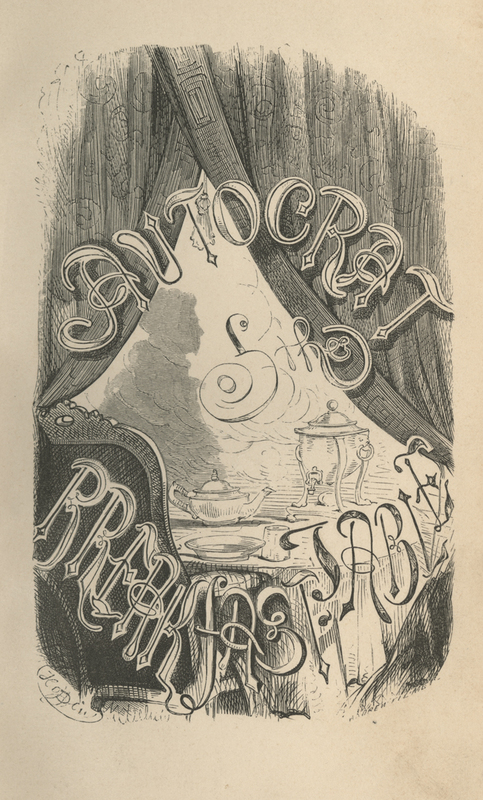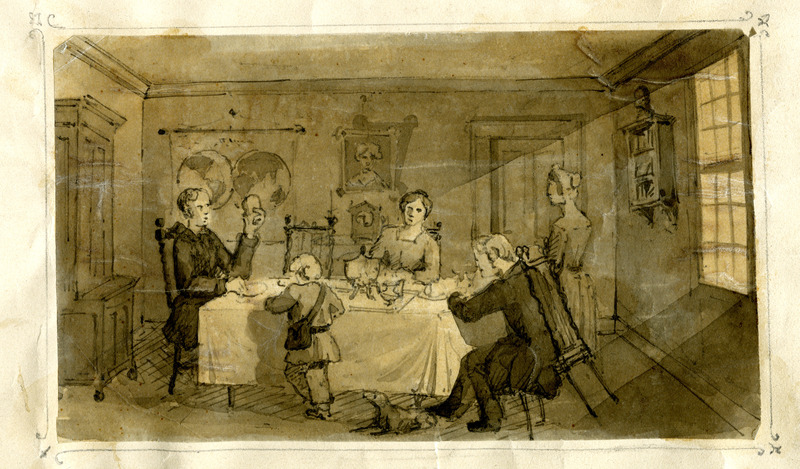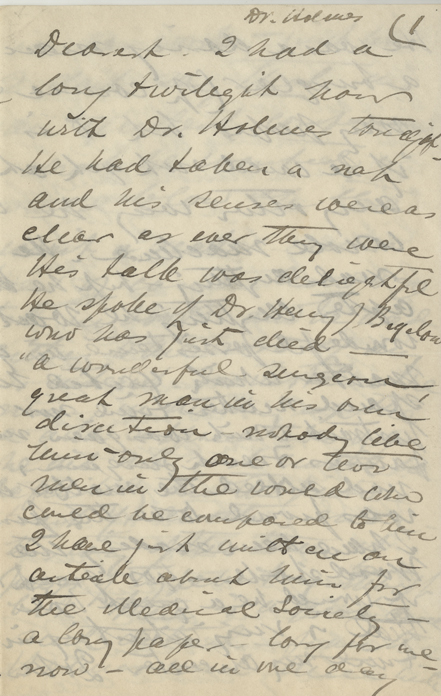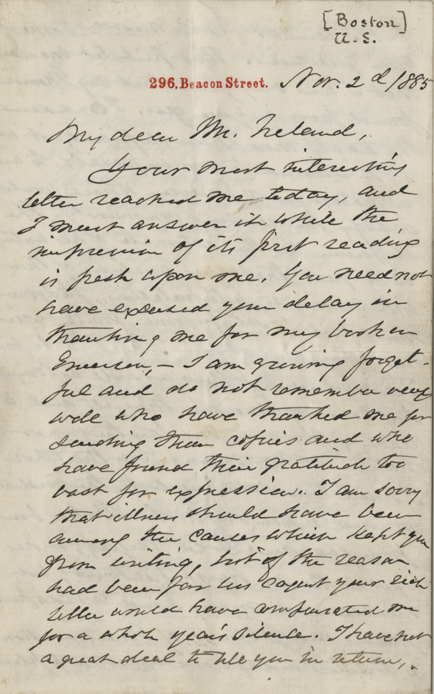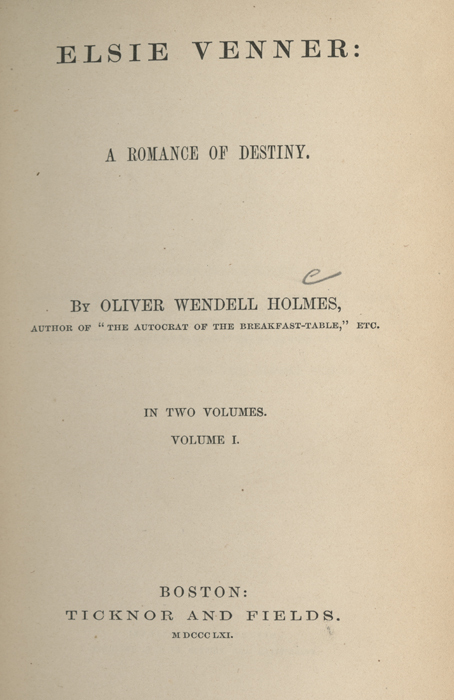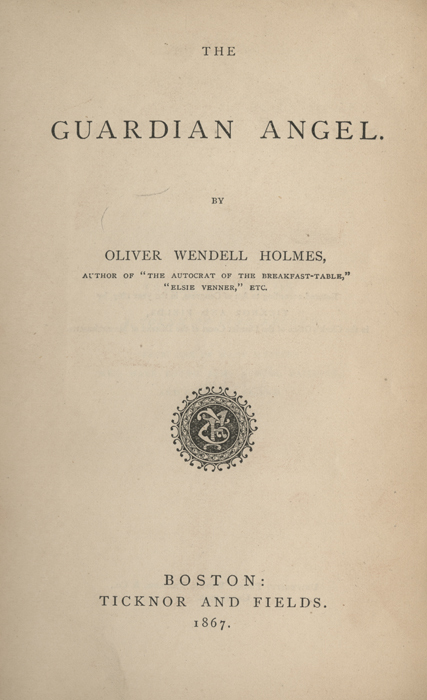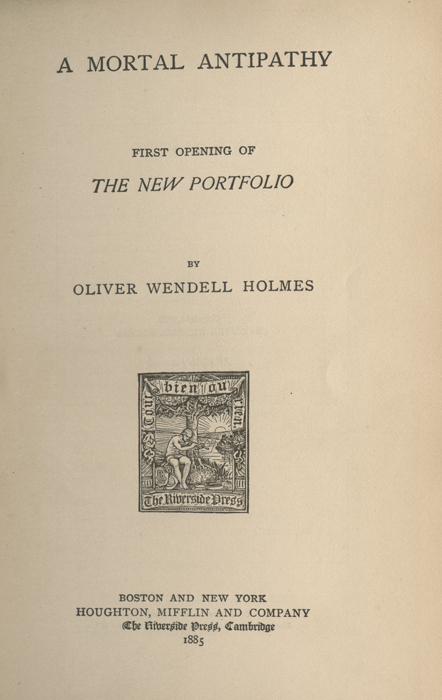Literature
Beyond the sphere of poetry, the literary reputation of Oliver Wendell Holmes rests largely on the loosely connected series of essays, poems, and aphorisms which forms The autocrat of the breakfast-table. In 1857, a new periodical publication, The Atlantic Monthly began to appear, under the editorship of James Russell Lowell. Holmes would be a regular contributor, and the first issue contains a prose piece, “The Autocrat of the Breakfast-Table,” where the Autocrat, a mouthpiece for Holmes, presides over the inhabitants of a Boston boarding-house. The Autocrat essays and poems were collected and published as a single volume in 1858; this is a first edition of their appearance in book form. Three separate impressions of The autocrat were printed between November 12 and December 7, 1858, and, reputedly, some 20,000 copies sold during that period—half of them during the first three days following publication.
Holmes would return to the format throughout his career, publishing The Professor at the Breakfast-Table (1860) and The Poet at the Breakfast-Table (1872), along with other volumes of essays and poetry.
Annie Fields was the wife of James T. Fields, the publisher of The Atlantic monthly, and a close friend of Holmes. Here, in this letter to novelist Sarah Orne Jewett (1849-1909), she describes a visit with Holmes who speaks of his reverence for the late Henry Jacob Bigelow and recalls the formation of The Atlantic and his early literary career and experiences on the lecture circuit. “In 1857 Lowell wrote me that a magazine was to be started in Boston and if I would write for it he would edit it. I thought that a great compliment of course but it seemed to me he was out of his head—but as it proved he showed great discernment because without vanity I may say I helped to make the magazine a success and to sustain it.”
After the death of transcendentalist Ralph Waldo Emerson in 1882, Holmes was approached to write his biography for the “American Men of Letters” series. After publication, he received this letter from journalist Alexander Ireland (1810-1894), long a close friend of Emerson’s, who had himself printed a memorial volume and reminiscences of his visits to England in 1882. Holmes wrote of his own efforts, “I considered the task more than difficult…. The difference in the estimate of his writings is so great that any analysis of them with comments, interpretations, judgments, must fail to satisfy some, must exceed the estimate of others. I tried to be fair; I endeavored to follow as well as I might the course of Emerson’s thoughts and to reach as far as in me lay the inner nature of the man. On the whole I have been satisfied with the verdicts passed upon my book.”
This is a first edition of Holms’ novel Elsie Venner. It is a presentation copy from Holmes to Henry Jacob Bigelow (1818-1890).
After Holmes’ death, his friend and fellow novelist William Dean Howells (1837-1920) said of Holmes' work, “His novels all belonged to an order of romance which was as distinctly his own as the form of dramatized essay which he invented in the Autocrat. If he did not think poorly of them, he certainly did not think too proudly, and I heard him quote with relish the phrase of a lady who had spoken of them to him as his ‘medicated novels.’ That, indeed, was perhaps what they were; a faint, faint odor of the pharmacopoeia clung to their pages; their magic was scientific. He knew this better than any one else, of course, and if any one had said it in his turn he would hardly have minded it. But what he did mind was the persistent misinterpretation of his intention in certain quarters where he thought he had the right to respectful criticism in stead of the succession of sneers that greeted the successive numbers of his story; and it was no secret that he felt the persecution keenly.”

